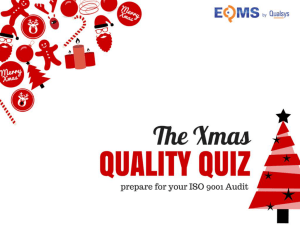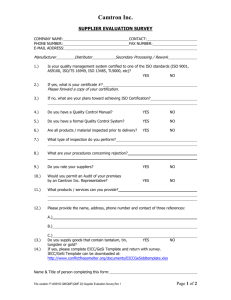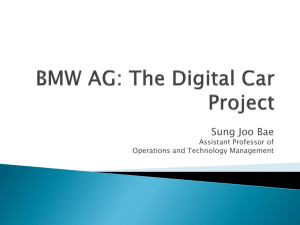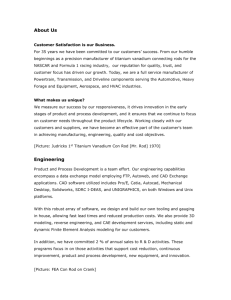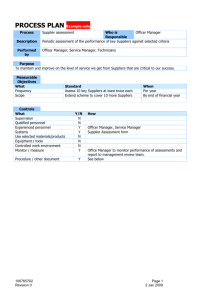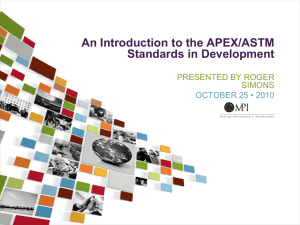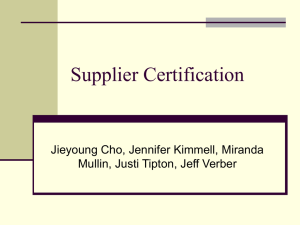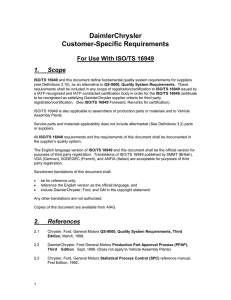Maintaining Quality along the Supply Chain and Importance of
advertisement
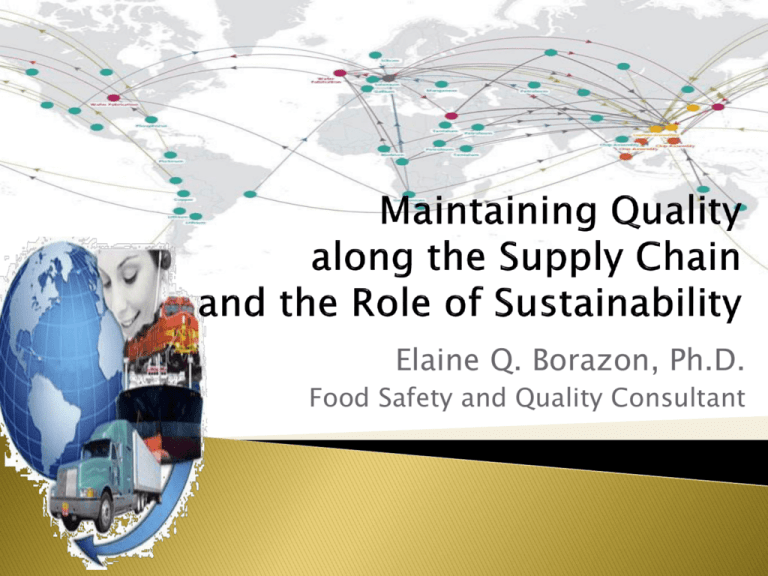
Elaine Q. Borazon, Ph.D. Food Safety and Quality Consultant Definition of Quality Quality in the Design Process Total Quality Offering to Customers The EFQM Model Components of Quality Functional Perspectives on Quality Spheres of Quality Supply Chain Supply Chain Quality Management Quality Management and Sustainability Composite of characteristics/attributes which differs from unit to unit (Kramer and Twigg, 1983) “The totality of features and characteristics of a product or service that bear on its ability to satisfy stated or implied needs” (ISO 9000: 2000) Source: Brown, et al., 2013 Source: Brown, et al., 2013 Source: Brown, et al., 2013 Product features Freedom from deficiencies Product features Manufacturing industries Service industries Performance Accuracy Reliability Timeliness Durability Friendliness and courtesy Serviceability Anticipating customer needs Aesthetics Knowledge of server Availability of options and expandability Appearance of facilities and personnel Reputation Reputation Freedom from deficiencies Manufacturing industries Service industries Product free of defects and errors at delivery, during use, and during servicing Service free of errors during original and future service transactions All processes free of rework loops, redundancy, and other waste All processes free of rework loops, redundancy, and other waste Supply Chain Operations Strategic Management Marketing Financial Human resource Cost (Efficiency) Cycle Time (Speed) Reliability (Dependability) Quality Source: Foster, 2007 Quality Management Quality Assurance (proactive) Quality Control (reactive) Source: Foster, 2007 “The assembly and management of all activities aimed at the production of quality by organizations of various kinds” (FAO, 1998) Maintenance of a specified finished product characteristics (i.e standards) every time it is manufactured Implies efficient control of raw materials and of production processes Ensuring customer satisfaction (ITC 1991) Is the operational techniques and the activities which sustain a quality of product or service that will satisfy given needs; also the use of such techniques and activities (American National Standards Institute) “the assembly of all planned and systematic actions necessary to provide adequate confidence that a product, process, or service will satisfy given quality requirements” (ISO) Supply Chain Supplier Supplier Storage Service Customer Supplier Supplier Supplier Storage Supplier Manufact uring Storage Production Distributor Retailer Distribution Purchasing Receiving Storage Operations Storage Source: Stevenson, 2005 Customer -Choice of seed variety -Agricultural practices Planting Growing -Harvesting method -Postharvest handling practices Harvesting Transporting -Elimination of foreign matter -Packaging quality -Loading/unloading conditions -Cold chain condition Sorting Processing -Storage conditions -In-store handling -Cold-chain condition -Irrigation -Use of pesticides -Protection from frosts, insects, etc. -Manufacturing practices -Physico-chemical, sensory, and microbiological tests Retailing Factors affecting quality along a fruit chain (Trienekens and Zuurbier, 2008) Food Processor Supermarkets Hotels Food Chains Interactive communication Source: Faergemand and Jespersen, 2004 Hazard control System management Customer focus Leadership Involvement of people Process management Continual improvement Factual approach to decision-making Mutually beneficial supplier relationships (ISO) 3 Pillars of sustainability Economic growth Ecological balance Social responsibility (DESA, 1992) Brown, S., Bessant, J.R., and Lamming, R. (2013). Strategic Operations Management. Canada: Routledge. DESA (1992), Report of the United Nations Conference on Environment and Development(Rio de Janeiro, June 3-14 1992), United Nations Department of Economic and Social Affairs, New York, NY. Faergemand, J. and Jespersen, D. (2004). ISO 22000 to ensure integrity of food supply chain . ISO Management Systems, September-October. FAO. (1998). Guidelines for Quality Management in Soil and Plant Laboratories.(FAO Soils Bulletin - 74).Retrieved from http://www.fao.org/docrep/w7295e/w7295e00.htm#Contents. International Trade Center UNCTAD/GATT. 1991. Quality Control for the Food Industry: An Introductory Handbook. Geneva, Switzerland: ITC UNCTAD, 191 pp. ISO 9000 Quality management and quality assurance standards. Guidelines for selection and use. Kramer, A. and Twigg, B.A. 1970. Quality Control for the Food Industry. Vols. 1 & 2. Connecticut, USA: AVI Publishing Co. Stevenson, W. (2005). Operations management. USA: McGrawHill. Trienekens, J. and Zuurbier, P. (2008). Quality and safety standards in the food industry, developments and challenges. International Journal of Production Economics, 113, pp. 107-122.

